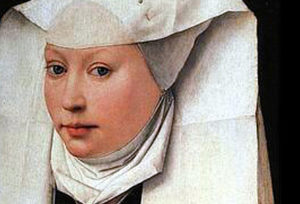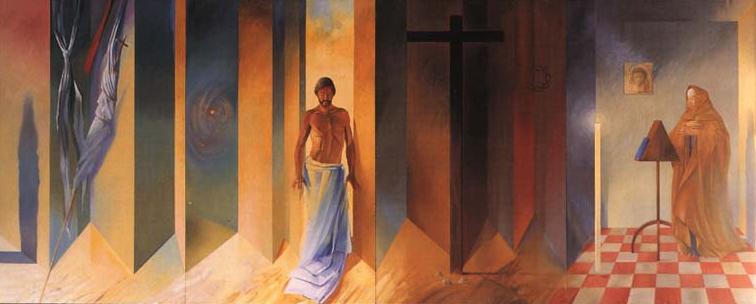 Dame Julian of Norwich; Blessed Julian; Juliana, Anchoress at Norwich; Mother Julian of Norwich; Saint Julian. She is referred to in many ways and names, but in fact very little is known about her outside of her writings or her call to be an anchoress at Norwich. Even her name is a question, as it was customary to adopt the name of the church in which one was anchoress. In her case it was Saint-Julien du Mans, the first bishop of Le Mans France. Julian of Le Mans dates to approximately the 3rd century. Although it is possible her church was named for the 9th century Julian the Hospitaller it more likely is named for Julian of Le Mans.
Dame Julian of Norwich; Blessed Julian; Juliana, Anchoress at Norwich; Mother Julian of Norwich; Saint Julian. She is referred to in many ways and names, but in fact very little is known about her outside of her writings or her call to be an anchoress at Norwich. Even her name is a question, as it was customary to adopt the name of the church in which one was anchoress. In her case it was Saint-Julien du Mans, the first bishop of Le Mans France. Julian of Le Mans dates to approximately the 3rd century. Although it is possible her church was named for the 9th century Julian the Hospitaller it more likely is named for Julian of Le Mans.
Julian was born in Norwich, England, in 1342. At the age of thirty she became seriously ill. It was during this illness that she experienced sixteen revelations of God’s divine Love. Julian refers to the revelations as “showings.” Though not certain whether Julian was a part of a religious order at the time of these showings, it’s generally accepted that this event lead her to a life as an anchoress.
An anchoress was basically a recluse who withdrew from society to a life of contemplation and solitude, but like many hermits at that time it was the custom to give counsel to other Christian’s who sought them out. In the depths of the Dark Ages, among political upheaval and the Black Plague, Julian provided hope for anyone who visited the window of her anchorhold.
Julian’s life was long. She outlived her share of kings, as well as three plagues. She witnessed through the visitors at her window, the wrath of war and the Peasants Revolt. She endured the Great Schism of 1378 and the bloody drama that had become routine in those times, rising above it all, keeping her heart fixed on the nurturing “motherly” qualities of God and Jesus.
After the revelations on May 8th 1373, Julian began to record the “showings.” First she recorded what is known as the short version of Revelations of Divine Love. This is basically the sixteen revelations as they were written in the immediacy of the event. Over the next twenty years she would write the long version, prayerfully contemplating the meaning of each showing until she had completed eighty-six chapters. Julian was modest about her skills as a writer, and though it may be true that she was not highly educated as a young woman, in the fullness of time she rose as a great literary figure and theologian. She is considered the first woman to write a book in the English language.
Julian’s writings remained obscure and virtually unavailable to the general public until they were finally published in 1901 and edited by Grace Warrack. We are very fortunate today to have access to the words of a warm and loving person who can show us God as Mother; and with her beautiful and uncanny way, guide us through our trying times the same way she had for a dark and love-hungered world centuries before.


